History Peeps: Dr. Brian Rouleau, Associate Professor of History

Dr. Rouleau early in his academic career in his office surrounded by books.
Brian Rouleau was not slow to embrace the Aggie spirit. One of his first acts upon arriving in 2010 was to purchase a pair of cowboy boots and begin two-stepping lessons with the Texas Aggie Wranglers, the university’s competitive dance group. “I never did master two-stepping,” he admits, “but it was a lot of fun.” With an impressive string of academic publications and a reputation for witty, thought-provoking lectures, he is now in the final stages of becoming a full professor.
Dr. Rouleau credits his teaching style to a graduate advisor at the University of Pennsylvania, famed historian of indigenous America, Dr. Daniel Richter. Dr. Rouleau relates that he felt apprehensive in the first year in the graduate program (“I was convinced there had been a gross error in the admissions department”) because of the quality of work produced by his graduate school colleagues and the eminence of his advisor. Richter mentored graduate students closely, however, and the two rapidly became close. Dr. Rouleau has modeled much of his scholarship on Richter’s “reading against the grain” method, which means reconstructing the world of a person or group who did not leave behind a personal record by gleaning clues from the writings of those who did.
This can be seen most clearly in Dr. Rouleau’s first book, With Sails Whitening Every Sea: Mariners and the Making of an American Maritime Empire (2014), an account of the previously invisible history of American seafarers in the Antebellum Era. At a time when the US diplomatic service was tiny, American sailors were the principal points of cultural exchange between the United States and the rest of the world. In a sense, they were informal American diplomats. While most of Dr. Rouleau’s sources were written by American sailors, he uses Richter’s methods to reconstruct various events from the perspectives of foreign peoples they encountered as well. Last year, he published a second book, Empire’s Nursery: Children’s Literature and the Origins of the American Century (2021), on the social impact of children’s literature during the nineteenth and twentieth centuries.
When not teaching, Dr. Rouleau is a cinema fan and regularly scouts the TAMU library’s free movie borrowing program located on the first floor of the Evans annex. His favorite movie is Stanley Kubrick’s The Shining (1980), which he loves for its complex storyline and symbolism.
To what historical figure would Dr. Rouleau like to say “Howdy,” given the chance? He would be interested in meeting Benjamin Franklin because he was “famously a very engaging conversationalist and entertaining storyteller.” But he is not certain that Franklin would be a good source for reliable facts. “He strikes me as someone who would be coy about fact-finding questions regarding the past,” Dr. Rouleau observes. Perhaps only reading against the grain could reveal deeper truths were this meeting to occur.
By Patrick Grigsby ‘27
